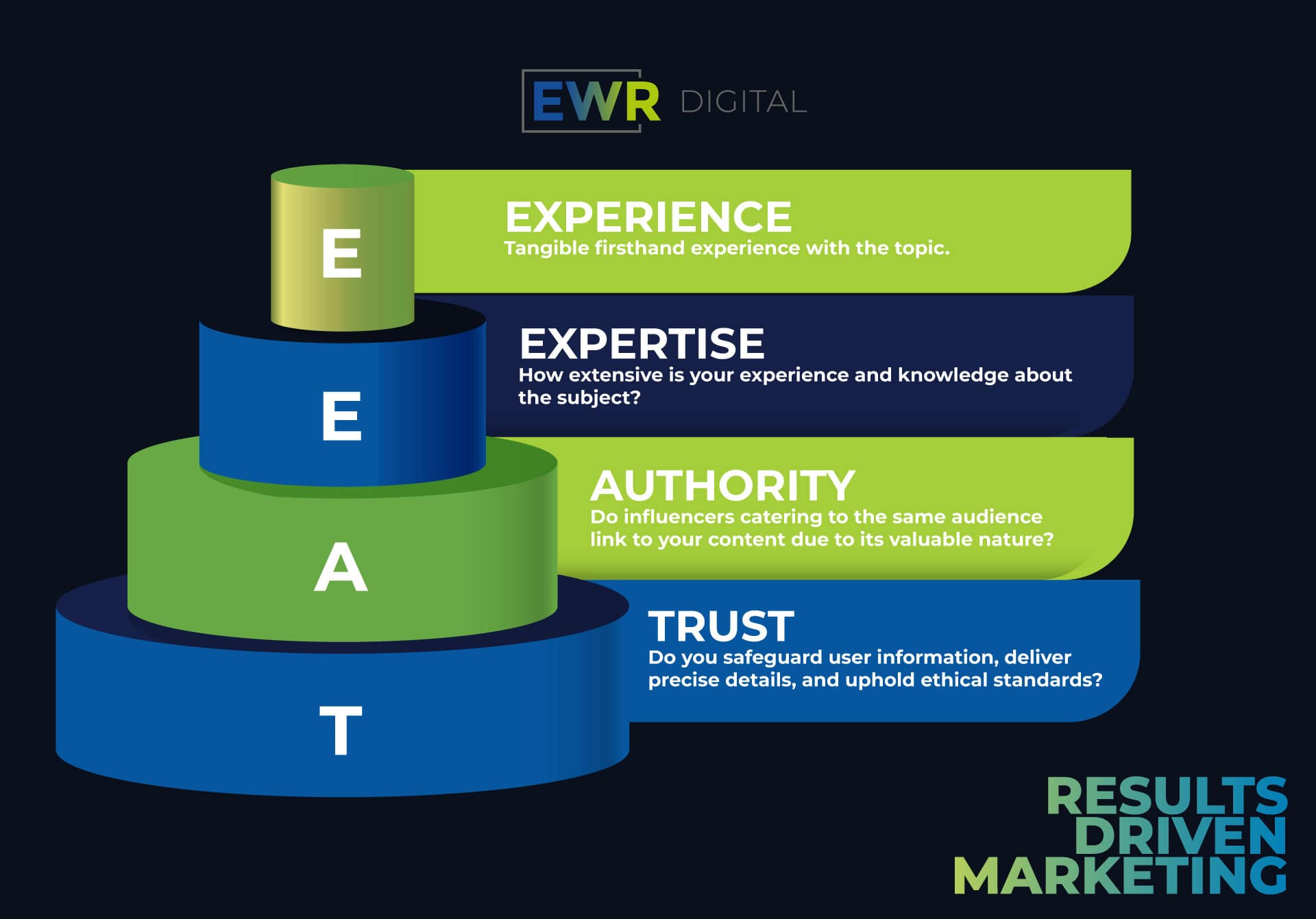
All About Google E-A-T: Part 3 – Trustworthiness
Content creators and marketers walk on eggshells when it comes to search engines and their ever-changing rules and regulations. One of the most talked-about guidelines is Google E-A-T, which is designed to help search engines discover, rank, and prioritize content that they deemed relevant and helpful for those searching for specific inquiries.
As part of their recent Medic update, Google made it known that they would be prioritizing content that was authoritative, trustworthy and written by someone who demonstrated expertise on the topic. That means that brands who weren’t adhering to the Google E-A-T standards could find themselves in a pickle.
What is Google E-A-T? Your Quick Recap
 The guidelines that make up Google E-A-T have been around since 2014. These guidelines were introduced as part of their Search Quality Rater Guidelines, which outlined what Google’s employees should look for when it came to ranking websites, pages, and other content.
The guidelines that make up Google E-A-T have been around since 2014. These guidelines were introduced as part of their Search Quality Rater Guidelines, which outlined what Google’s employees should look for when it came to ranking websites, pages, and other content.
The goal of these guidelines was to help provide those using the search engine to find solutions to their problems or pain point with ease.
To do that, Google expected content creators to create and share content that could easily be identified as authoritative and written by someone who had some level of expertise on the topic. However, they had to build a level of trust between the brand and its audience.
That is where the acronym E-A-T came into play:
- E: Expertise
- A: Authoritativeness
- T: Trustworthiness
While the Google E-A-T guidelines had been around for quite some time, they began trending in 2018 when the Google Medic update was released, and those who fell under YMYL (Your Money or Your Life) websites began noticing swift declines in their overall traffic.
Why? Because they weren’t creating the authoritative, trustworthy content by someone with experience/expertise in the niche. Instead, they had been focusing on generic, lightly optimized content in hopes of drawing attention to their brand.
As the update began weeding out the weak content, more and more brands started looking for answers as to how they could improve their content and, in turn, increase their website traffic – hence, the increase in searches for Google E-A-T.
Google E-A-T Part 1 Recap – Expertise
As Google continues to update its content quality guidelines, it is crucial to take the time to understand what exactly is being prioritized. For Google E-A-T, you want to first dive into what they are looking for when they say “expertise.”
Content awarded the level of expertise is content of the utmost highest quality but is content that is 100% relevant to your readers and their needs and showcases your ability to research a topic and share that information with your audience.
Google E-A-T Part 2 Recap – Authoritativeness
According to Google E-A-T, the next piece of the puzzle when it comes to ranking content is identifying and ranking content for overall authoritativeness.
Authoritative content is unique to your audience’s needs, and that is written by someone who has established their expertise in the niche/topic. This is content that readers can rely on for accurate information, leaving them with answers to their questions – not more questions.
Google E-A-T Part 3: Trustworthiness
Understanding what Google means by expertise and authoritativeness is the tip of the iceberg. The final piece of the puzzle is trustworthiness. It is essential to understand that trustworthiness accounts for accurate information and the quality of your website.
What Exactly is Trustworthiness?
In a traditional sense of the word, content marketers understand that trustworthy content is backed by sufficient research, written with the reader in mind, and helps them address a problem or present them with a pain point solution.

However, when presenting solutions, you should be doing so in an honest, non-promotional manner. Remember, there is a time and place for promotions, and when building your brand reputation, you want to focus on educating your audience, not outright selling to them. Research shows that approximately 70% of consumers prefer to learn about a brand through their educational content as opposed to their purely promotional content.
How Does Google Define Trustworthiness?
According to Google’s Search Quality Evaluation Guidelines, the search engine giant defines trustworthiness by not only the content being shared but also by the trustworthiness of the creator of the content – also referred to as the main content (MC) creator – and the trustworthiness of the website as a whole.
That means that Google takes into consideration:
- The amount of content on your website
- The level of expertise of the content on the website as a whole
- The information presented in each piece of content
- How relevant that information is to the intended audience
- The reputation of the brand
- The reputation of the MC creator
- The quality of the links used in the MC
While that may seem like quite a lot of checkboxes that need to be attended to, the good news is that if you’ve been practicing proper search engine optimization (SEO) and content marketing best practices, then you are already on the right track.
You understand the importance of high-quality links, topic research, and creating high-quality content that directly addresses the most common questions and concerns that your audience is seeking information on.
What Impact Does Trustworthiness Have on Your Website?
Your website’s trustworthiness plays a vital role in not only how many visitors you get but in the number of new potential leads and conversions. How? It helps with building brand awareness, as well as brand credibility.
Content marketing guru Neil Patel said it best – “If you are unknown, you are unsafe.” That simply means that if people come across your website and do not recognize you, they have no reason to trust you, your solutions, or anything you have to say.
If you don’t focus on building your credibility through the content you create and/curate and share, the lower your domain authority score. Your domain authority score is a ranking that shows consumers how successful a site is compared to similar sites in their niche/industry.
Another tactic your audience may use to determine just how successful your website is is its overall Alexa ranking. This score tells your audience how popular a site is – and the lower the ranking, the more popular it is and likely more authoritative and trustworthy.
For example, if your site has an Alexa ranking of 150,000 and your competitor has 175,000 – your site will be seen as the more successful because it has been vetted by search engines and your ideal audience and proven to be authoritative, trustworthy, and relevant to their needs.
The higher your domain authority score and the lower your Alexa ranking, the better your chances of attracting more website traffic. With more traffic comes more significant chances of building your audience and converting them to potential paying customers.
What Impact Does Trustworthiness Have on Your Audience?

The best way to approach trustworthiness is to keep in mind that people coming across your website are looking for any reason to leave. If you’re an unknown brand or your domain authority is low, those who come across your brand assume that you have little to offer them.
If you want to give them a reason to pay attention, focus your time and resources on creating expert, authoritative content.
This is how the Google E-A-T system works. When followed, these guidelines ensure that you generate only the best content to help you build brand awareness, create trustworthy content and earn the trust of those in your audience.
The more trustworthy your relationships are, the more likely they are to make the conversion from lead to a customer, and the more likely they are to recommend you to others.
How to Create Trustworthy Content Your Audience Will Devour
Recent studies show that trustworthy, authentic content plays an even bigger role in the consumer decision-making processes than ever before – with 90% of consumers saying that authenticity is important to them when choosing which brands they will do business with.
This is why it’s crucial to build brand visibility online. The content you create and share online will help your audience determine just how authentic you are, and if they find your content and solutions worthwhile, it will help build those vital, trustworthy relationships you’re looking for.
Not quite sure how to begin creating trustworthy content that will come off as authentic and educational? Here are a few tips to get you started:
1. Understand Who Your Audience Is
Understanding your audience is vital in each step of the Google E-A-T guidelines. However, when it comes to building trustworthiness, taking the time to genuinely get to know your audience and their needs is more critical than ever before.
If you don’t know who your audience is and what they are searching for on the internet, your digital marketing efforts will be for naught.
To help you identify what type of content your audience will devour, you want to take the time to create audience personas that outline who would benefit from your brand and the solutions you have to offer. From there, work backward, identify the topics that would interest them the most, and start researching keywords, phrases, and topics that would draw their attention.
2. Conduct Research into Their Wants and Needs – Not Your Own
Creating content for the sake of creating content will do nothing to build your authoritative voice, and it will not help you a bit in earning the trust of your ideal audience.
Why – because chances are, you are not creating content that is relevant to their wants and needs. If your niche is supposed to be digital marketing and you are doing an extensive piece on the benefits of newspaper advertisements, you aren’t creating content beneficial for those in the digital marketing niche.
In this situation, research is your best friend. You can conduct a variety of different types of research to help you determine what would suit your audience’s needs, including:
- Consumer research – gives you a deeper knowledge of who your audience is, what it is they are searching for, and why.
- Industry Research – this research can help you identify new trends that you may be unaware of to help you better reach your audience.
- Competitor Research – by looking into your competitors and what is and isn’t working for them, you can better understand what your audience needs.
Each type of research can provide you with insights that you may not have had access to before.
3. Utilize Your Research to Create Shareworthy Content
With your research ready, you can start creating shareworthy content. Remember, if you’re trying to build your credibility to boost your trustworthiness, you want to focus your attention on educational content. A few excellent examples of content worth creating include:
- Long-form blogs with plenty of research-backed statistics
- Whitepapers
- Industry reports
- Guest blogs for other websites
- User-generated content – such as customer experience features

This type of content allows you to directly address your audience’s needs while being as transparent as possible.
4. Maintain Regular Communication with Your Audience Across Platforms
Finally, when building your trustworthiness amongst your audience, you want to go far beyond creating content for your website. Take that relationship beyond your website and encourage interactions and engagement on other platforms as well.
An excellent way to do this is by sharing your content on your social media platforms. Doing so will allow you to start conversations with the audiences you build elsewhere and encourage them to visit your website for more great information, solutions, etc.
On top of that, social media provides you with channels to further foster those vital audience relationships. Maintaining an active presence by addressing comments, questions, and concerns on your social media profiles shows your audience they can rely on you pretty much anytime.
EWR Digital Helps You Build Trusting Relationships with Your Audience
To ensure your content marketing strategy’s success, it’s vital to understand each piece of the Google E-A-T acronym. Building trust between you and your audience is crucial in the success of your business, and by adhering to these guidelines, you’ll be surprised at just how simple it can be to not only build these relationships but maintain them for the long run.
If you’re wondering how EWR Digital is the expert on E-A-T, and can help your brand build create trustworthy content, and boost your relationship with your audience, then contact us today for more information!
